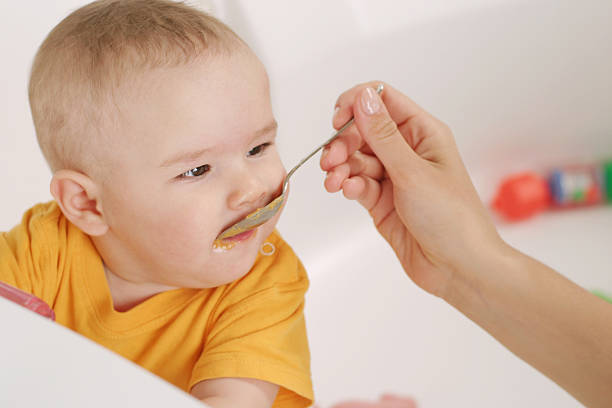One of the most exciting milestones in your baby’s journey is the very first bite of solid food. After months of milk, the thought of introducing solids to baby feels like stepping into a new world of flavors, textures, and experiences. But for many parents, it can also feel overwhelming.
When should you start? What foods are safe? How do you avoid common mistakes? Let’s explore a complete, parent-friendly guide that makes this transition smooth, safe, and joyful.
When to Start Introducing Solids to Baby
Most pediatricians recommend introducing solids around 6 months of age. At this stage, your baby’s digestive system is more developed, and they usually show signs of readiness, such as:
- Sitting with little or no support
- Showing interest in food when others eat
- Opening mouth when offered a spoon
- Losing the tongue-thrust reflex (pushing food out automatically)
👉 Some babies may be ready a little earlier or later. Always check with your pediatrician before starting.
Benefits of Starting Solids at the Right Time
- Supports growth: Solids provide nutrients like iron and zinc that breast milk or formula alone may not supply after 6 months.
- Encourages chewing skills: Learning to manage textures helps with speech development too.
- Introduces variety: Early exposure to healthy flavors reduces picky eating later.
- Builds independence: Self-feeding helps babies learn coordination and confidence.
First Foods to Introduce to Your Baby
Starting solids should be simple and gentle. Begin with single-ingredient, soft, and easily digestible foods. Here are some great first foods:
- Iron-rich baby cereals (like rice or oatmeal mixed with breast milk or formula)
- Mashed fruits – banana, pear, apple, avocado
- Soft cooked vegetables – carrot, sweet potato, pumpkin, peas
- Pureed lentils or beans – a good plant-based protein option
- Well-cooked mashed egg yolk – packed with nutrients
- Full-fat yogurt (unsweetened) – rich in calcium and probiotics
Tips for Introducing Solids to Baby Smoothly
- Start slow: Offer one new food at a time and wait 3 days before trying another to check for allergies.
- Begin with small amounts: Just a teaspoon or two is enough at first.
- Keep it soft: Food should be mashed, pureed, or very soft to avoid choking.
- Stay patient: Babies may spit out food at first—it’s normal!
- Create a routine: Offer solids once a day at the same time to build habit.
- Let baby explore: Allow them to touch, play, and even make a mess. It’s part of learning.
Mistakes to Avoid When Introducing Solids to Baby
Many parents unknowingly make common mistakes during this stage. Avoid these to keep feeding safe and healthy:
- ❌ Starting too early (before 4 months) – baby’s digestive system is not ready
- ❌ Adding sugar, salt, or honey – harmful for infants under 1 year
- ❌ Offering cow’s milk as a main drink – it lacks the right nutrients for babies
- ❌ Forcing food – let your baby set the pace
- ❌ Ignoring choking hazards – avoid nuts, grapes, popcorn, and hard chunks of food
Baby-Led Weaning vs. Spoon-Feeding
Parents often wonder whether to spoon-feed purees or jump into baby-led weaning (BLW), where babies feed themselves soft finger foods.
- Spoon-feeding: Lets parents control portions, easy to introduce single foods.
- Baby-led weaning: Encourages independence, develops motor skills, helps baby eat with the family.
👉 Many families do a combination—starting with purees and gradually offering finger foods.
Signs Your Baby Is Enjoying Solids

- Opening mouth when offered food
- Reaching for the spoon or food
- Swallowing instead of pushing food out
- Excitement during mealtimes
If your baby turns away, spits out, or refuses to open their mouth, don’t force it. Try again later.
Foods to Avoid in the First Year
To keep your baby safe, avoid:
- Honey (risk of botulism)
- Salt and sugar (strain on kidneys, unhealthy habits)
- Whole nuts, popcorn, raw carrots (choking hazards)
- Cow’s milk as a main drink before 12 months
- Processed and fried foods
Instead, focus on whole, natural, and fresh foods for infant nutrition.
Creating a Positive Mealtime Environment
Feeding is not just about nutrition—it’s also about connection. Make mealtimes fun by:
- Sitting together as a family
- Smiling, encouraging, and making eye contact
- Avoiding distractions like TV or phones
- Celebrating small successes (even if messy!)
Supporting Parents Along the Way
Introducing solids is a journey, and no parent has to do it alone. Communities like Kidzy offer helpful resources and parenting support to guide you through milestones with confidence.
And when it comes to safe, fun baby feeding tools and toys, you can check TotzPlay, where you’ll find products designed to make this stage more enjoyable for both you and your baby.
Final Thoughts
Introducing solids to baby is an exciting milestone filled with curiosity, love, and a little mess. Remember, every child is unique, and what works for one may not work for another. Start slow, keep meals stress-free, and celebrate the journey.
Whether you’re offering the first spoonful of cereal, a tiny piece of banana, or exploring baby-led weaning, the goal is the same: helping your little one grow healthy, happy, and confident with food.
At the end of the day, the best feeding choice is the one that works for your baby and family. Trust your instincts, enjoy the process, and cherish these little moments—you’re doing a great job!





